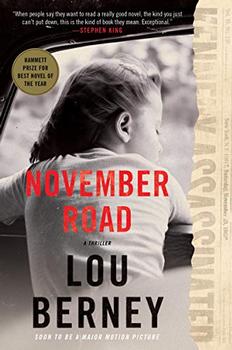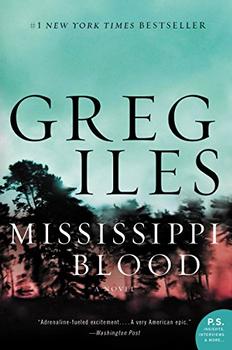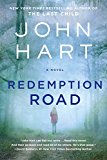Summary | Excerpt | Reviews | Beyond the book | Read-Alikes | Genres & Themes | Author Bio

You'll be forgiven if, like me, you roll your eyes at the end of the first chapter of November Road. We've barely had a chance to sink our teeth into the pages and Frank Guidry has already ratted on a fellow mob operator and bestowed the favor of sex on a random fawning woman he meets at a bar.
Morals are not really Guidry's thing and his every interaction with a human being seems to be a purely transactional affair. But there's an explanation for Guidry's foul character: as an orphan, he fell off a turnip truck from Ascension Parish, Louisiana and tumbled around the Faubourg Marigny, "living hand to mouth, stealing cans of pork and beans off the shelves of the A & P." When he grew up, he became a key operator in the inner circle of New Orleans mob boss Carlo Marcello, which is where we find him as the novel opens.
If you have heard the name Carlo Marcello before, you might remember that he was a real-life mob boss who, in one of many conspiracy theories (see Beyond the Book), was believed to have been the mastermind behind the assassination of President Kennedy. The novel rides on this hook: most of November Road is set in the immediate aftermath of the national tragedy and Guidry has very real reasons (imagined or not) to be afraid. You see, just a few days before the shooting, Guidry was the one who set up a blue Cadillac, a getaway car for the real assassin, in Dallas. And given that Marcello never likes to leave a project with strings untied, Guidry puts two and two together: he is one of those loose strings. Guidry hits the road hoping to outrun whoever it is that's out to get him.
Meanwhile, in small-town Woodrow, Oklahoma, Charlotte Roy, a young mother with two daughters, is trying to keep her family afloat with a dead-end job retouching pictures at a local photography studio. Her alcoholic husband and the larger tides of history have pushed her to her limits however. "Charlie" is suffocating under social constraints and, in an impulsive decision, runs away from home taking the children with her.
It is no secret that Guidry's path eventually intersects that of Charlotte's — "a small-town girl, as wholesome and dull as a field of corn, with a dog-eared New Testament in her purse and uncomplicated notions about right and wrong" — and their alliance is carved out of mutual convenience. They form an unlikely pair on the run, Guidry fleeing a hitman simply named Barone and Charlotte making her way to Los Angeles before guilt or her husband catches up with her.
Gripping novels are founded on brilliant characterization and/or a nail-biting plot. November Road's portrait of Guidry falls into the usual "criminal with a heart of gold" cliche-ridden trap but Charlotte's slow evolution into a woman realizing her own power is a thing of beauty. Author Lou Berney is an Edgar-award winner and it shows. The story moves along at a compulsive clip and is powered by crisp and sharp writing. A roadside motel is "a creaky old brick and knotty-pine relic that had been around since pioneer days. Probably it hadn't been dusted since then either. The wallpaper curling, the tiles chipped, one of the wagon-wheel chandeliers listing."
Amid all that narrative tension, Berney also expertly manages to chart Charlotte's tentative coming to terms with her newfound independence and her opaque view of Guidry's goings-on. "What was life but this? A series of rapid calculations: the shifting of weights, the balancing of scales," Guidry asks, early on.
Does Guidry's outlook change? Will his series of rapid calculations ultimately add up to danger? You will hold tight onto your seat to find out. I read November Road in one sitting on a Transatlantic flight. The resultant jet lag was well worth it.
![]() This review was originally published in The BookBrowse Review in November 2018, and has been updated for the
October 2019 edition.
Click here to go to this issue.
This review was originally published in The BookBrowse Review in November 2018, and has been updated for the
October 2019 edition.
Click here to go to this issue.

If you liked November Road, try these:

by Greg Iles
Published 2018
The final chapter in the Natchez Burning trilogy.

by John Hart
Published 2017
Over 2 million copies of his books in print. The first and only author to win back-to-back Edgars for Best Novel. Every book a New York Times bestseller. After five years, John Hart is back.
I find that a great part of the information I have was acquired by looking something up and finding something else ...
Click Here to find out who said this, as well as discovering other famous literary quotes!
Your guide toexceptional books
BookBrowse seeks out and recommends the best in contemporary fiction and nonfiction—books that not only engage and entertain but also deepen our understanding of ourselves and the world around us.